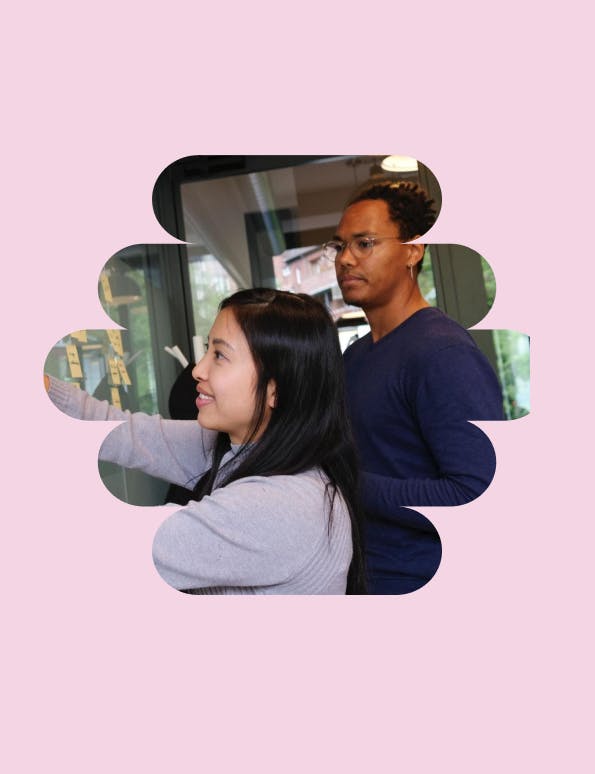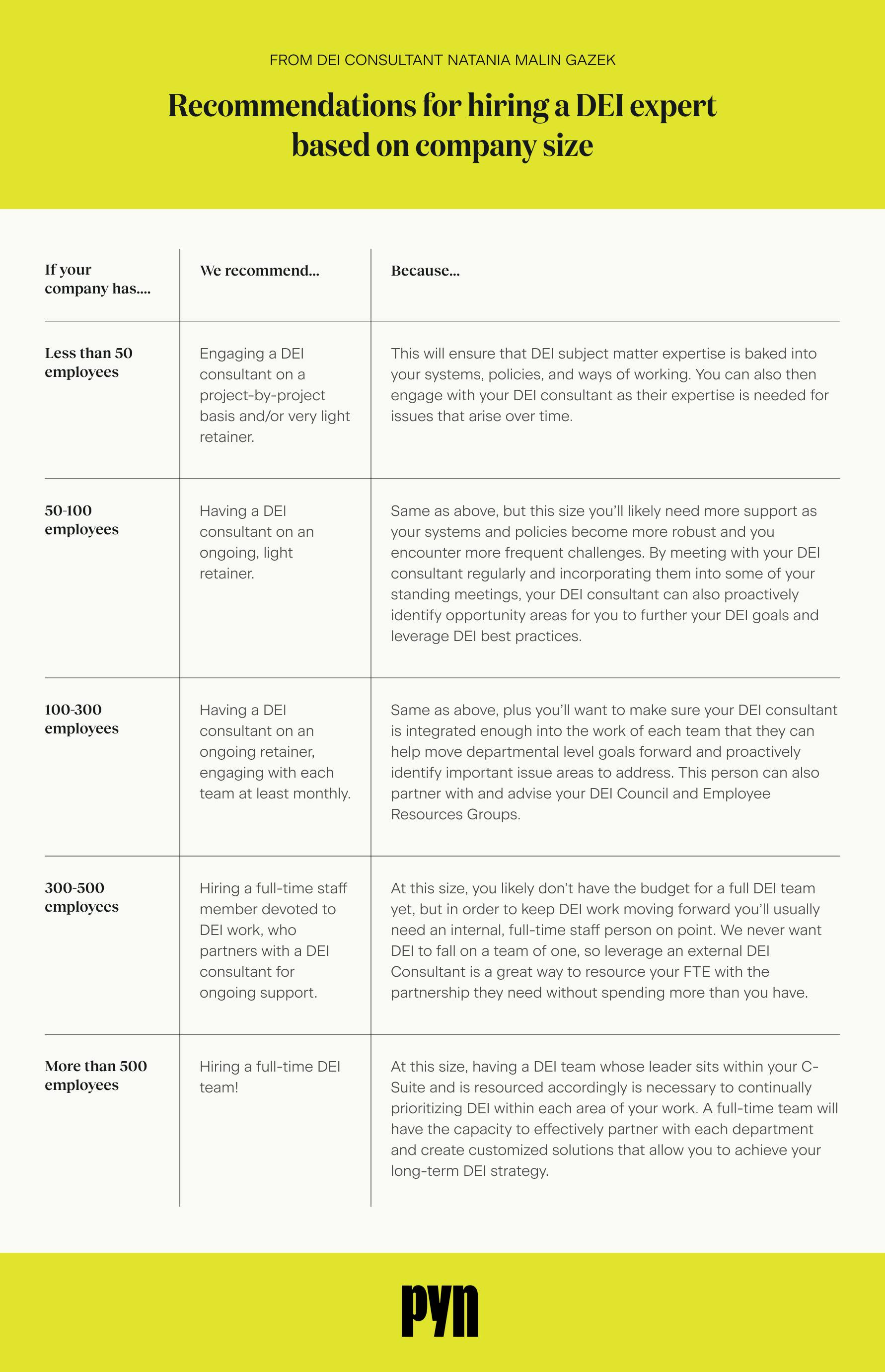
How do DEI and HR work together?
And why shouldn’t we just combine the two?

Written by
Natania Malin Gazek, Diversity, Equity, and Inclusion Consultant
I meet a lot of organizations who have been doing ad hoc Diversity, Equity, and Inclusion (DEI) work (hosting speaker series in honor of history months, arranging lunch and learn events after tragedies occur, establishing an Employee Resource Group here and there, etc). They see how invested their staff are in this work, so they become interested in more sustainable, long-term DEI work that’s better woven into the fabric of their organization.
Often, HR teams are the ones first tasked with taking on this investment. But is that optimal for the success of the HR team and the DEI work?
It turns out not to be.
Instead, DEI work has the strongest impact for an organization when it’s run separately from HR, by a DEI subject matter expert who is a peer to other senior leaders.
In this article, I’ll explore how those DEI experts work with the rest of leadership – especially HR - in a way that still makes it clear that DEI is everyone’s responsibility. Setting up strong working relationships between your DEI subject matter expert(s) and your HR team, as well as folks across the organization regardless of job scope, is critical for the success of your DEI work.
Here’s how we recommend setting up those relationships, and why.
Why not house DEI within HR?
Because of conflicting interests
Even though HR has evolved to encompass many functions and responsibilities, HR still bears the burden of ensuring an organization is compliant with employment law (ie, protecting the organization from potential lawsuits). DEI is more concerned with protecting staff and external stakeholders from being harmed by the societal systems of oppression (which all organizations perpetuate unless we set up alternative, equitable systems and structures to determine how we operate).
Unfortunately, leadership’s reliance on HR to provide legally required protections and accommodations to staff (which is so important!) can limit HR’s ability to fully pursue effective DEI work. For example, many common microaggressions are perfectly legal workplace behaviors. This means we often see HR feel trapped when trying to address microaggressions, as doing so can involve experimenting with emerging best practices that aren’t yet fully addressed by employment law. When HR partners with DEI, they can together develop culturally competent solutions to the common microaggressions that occur in the organization so that folks from historically and ongoingly marginalized groups are treated more equitably and feel a stronger sense of inclusion, and so the organization can become more sustainably diverse.
Because it allows for a more holistic impact
DEI should serve as an advisor to all parts of the org’s work, not just employee matters; and all parts of an org should be responsible for DEI work – not just HR!
Helping HR approach employee matters more equitably is an important part of DEI work. In fact, at some point in my work with each of my clients, many have noted about at least one of our projects, “This doesn't feel like what I thought DEI was. It feels like just a smarter way to approach HR.” In many ways, this is true: lots of DEI best practices are adjustments to common HR practices that make them more equitable. This is part of why I love working with Pyn – we help make sure that moments that matter are communicated about in more equitable, inclusive ways.
But that’s not the full scope of what effective DEI work covers, and limiting it to that is limiting the impact it can have for your organization. Below are some examples of how that can play out across different sectors.
Examples of effective DEI partnership
Here are a few examples of how DEI can effectively partner with various parts of an organization, and how different parts of an org need to be responsible for DEI work specific to their functional area:
- Communications and Marketing teams need to make sure the public-facing content they create resonates with diverse audiences and doesn’t cause unintentional harm.
- In tech, Software Engineering and Product teams need to ensure the products they’re creating can be used effectively by diverse groups and that their code doesn’t have harmful biases unintentionally baked in.
- In client services, client-facing or programming teams need to make sure the programs and techniques they deploy resonate with their target audiences and don’t unintentionally exclude people or perpetuate harm against marginalized groups.
- In CPG, Product Development teams need to ensure they’re avoiding cultural appropriation and properly compensating and crediting those communities whose culture influences their products.
- Of course, HR teams often want to make sure that they’re going beyond what’s legally required to integrate equitable best practices into policies across the entire employee lifecycle to create more demographically diverse teams and a more inclusive work environment.
- In every industry and every function, every leader on every team needs to make sure they’re consistently utilizing equitable systems and routines that contribute to their team members’ sense of inclusion and belonging at work. They also need to make sure they’re communicating with their teams in inclusive ways.
None of the above is possible without DEI subject matter expertise. That’s why it’s so important for DEI subject matter experts to partner with Comms and Marketing subject matter experts, Software Engineering leaders, client services leaders, Product Development leaders, etc to design customized solutions that work in each of these areas. We see consistently that making sure your DEI subject matter expert has a seat on your executive team as an equal to your head of HR and all of your other C-Suite roles (with the funding and power to match) is the best way to make this happen.
The solution: Hire a DEI subject matter expert
Or a team of experts, or a consultant! This addresses many of the challenges we’ve outlined above. But having a full-time DEI team isn’t appropriate for all types of organizations, whether for budgetary, size, or stage reasons.
Here are a few different options to consider, depending on your circumstances:

How can DEI SMEs and HR work together for optimal results?
Regardless of whether you hire a full-time DEI team or bring on a DEI subject matter expert as a consultant, the same principles and best practices apply. When it comes to thinking about how your DEI team or consultant works with your HR team, it’s no different.
Your DEI team are advisors to your HR team just like they are to your other departments. Each department –including HR– should have DEI goals they’re working towards, that your DEI team is advising them on. Your DEI team can also work with the leadership of each department to make sure that their other goals are written in ways that are aligned with the company’s DEI goals, and that they’re getting the specialized training they need so that they have the skills to achieve these goals.
This will be especially important for HR. Because HR is responsible for the entire employee lifecycle, and there are great DEI best practices to incorporate at each point in the employee lifecycle, your DEI team should work closely with your HR team to support them through building out the employee lifecycle as equitably as they can.
Your DEI team is a tremendous asset to your entire company – including and especially HR.

